Ditapis dengan

Melintas : An International Journal of Philosophy and Religion Volume 39 Nomo…
- Edisi
- Cetakan ke-1
- ISBN/ISSN
- 0852-0089
- Deskripsi Fisik
- 133 hlm.; 24,5 cm.
- Judul Seri
- -
- No. Panggil
- Melintas Vol.39/No.2 2023
- Edisi
- Cetakan ke-1
- ISBN/ISSN
- 0852-0089
- Deskripsi Fisik
- 133 hlm.; 24,5 cm.
- Judul Seri
- -
- No. Panggil
- Melintas Vol.39/No.2 2023

Melintas : An International Journal of Philosophy and Religion Volume 39 Nomo…
- Edisi
- Cetakan ke-1
- ISBN/ISSN
- 0852-0089
- Deskripsi Fisik
- 75 hlm.; 24,5 cm.
- Judul Seri
- -
- No. Panggil
- Melintas Vol.39/No.3 2023
- Edisi
- Cetakan ke-1
- ISBN/ISSN
- 0852-0089
- Deskripsi Fisik
- 75 hlm.; 24,5 cm.
- Judul Seri
- -
- No. Panggil
- Melintas Vol.39/No.3 2023

Melintas : An International Journal of Philosophy and Religion Volume 39 Nomo…
- Edisi
- Cetakan ke-1
- ISBN/ISSN
- 0852-0089
- Deskripsi Fisik
- 128 hlm.; 24,5 cm.
- Judul Seri
- -
- No. Panggil
- Melintas Vol.39/No.1 2023
- Edisi
- Cetakan ke-1
- ISBN/ISSN
- 0852-0089
- Deskripsi Fisik
- 128 hlm.; 24,5 cm.
- Judul Seri
- -
- No. Panggil
- Melintas Vol.39/No.1 2023
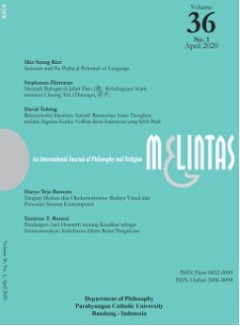
Melintas : An International Journal of Philosophy and Religion Volume 36 Nomo…
Image is language. Language is image. Today identities are characterised by the universe of images and words. Plurality turns into madness of things in reality that often cannot be perceived sanely anymore. How would Aristotle respond to all this? Back to particularity? Or, back to the Anima? It is tongue-in-cheek that everyone seems to satisfy his or her own narcissism by way of expressing tho…
- Edisi
- Cetakan ke-1
- ISBN/ISSN
- 0852-0089
- Deskripsi Fisik
- 138 hlm.; 29 cm.
- Judul Seri
- -
- No. Panggil
- Melintas Vol.36/No.1 2020
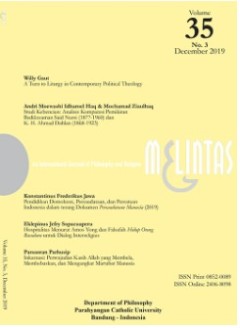
Melintas : An International Journal of Philosophy and Religion Volume 35 Nomo…
Democracy and religion seem to find it hard to make friends. But who knows? Sometimes politics and theology are about perspective. When reflected on from a particular perspective, public policies and doctrines might shake each other’s hand. We know that a term as strong as ‘belief’ can be catastrophic in discussion, but yet is often taken for granted without further realisation. It might …
- Edisi
- Cetakan ke-1
- ISBN/ISSN
- 0852-0089
- Deskripsi Fisik
- 110 hlm.; 29 cm.
- Judul Seri
- -
- No. Panggil
- Melintas Vol.35/No.3 2019
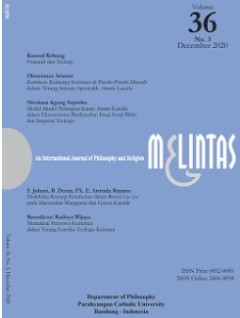
Melintas : An International Journal of Philosophy and Religion Volume 36 Nomo…
The word ‘theology’ seems to have provoked various reactions, ranging from inattention to suspicion. In the academy, that same word has often been forced to fit within the category of religion and is associated with unscientific matters and worse, irrational thoughts. Perhaps these are part of the consequences of seeing reason as the only way to understand reality. However, we can continue …
- Edisi
- Cetakan ke-1
- ISBN/ISSN
- 0852-0089
- Deskripsi Fisik
- 132 hlm.; 29 cm.
- Judul Seri
- -
- No. Panggil
- Melintas Vol.36/No.3 2020
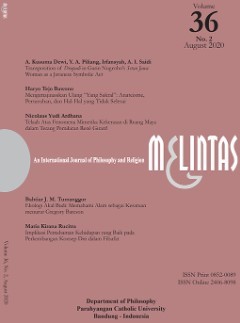
Melintas : An International Journal of Philosophy and Religion Volume 36 Nomo…
Grammar and order place us on track. Methods keep our discussions progress on each respective framework. What about layers? Two-dimensional map might be enough for some people to live their daily reasoning activities. However, layers of reality have been ‘there’ all the time, if only one is willing to shift his or her vantage point. Not everyone really cares for it. It is truly remarkable t…
- Edisi
- Cetakan ke-1
- ISBN/ISSN
- 0852-0089
- Deskripsi Fisik
- 136 hlm.; 29 cm.
- Judul Seri
- -
- No. Panggil
- Melintas Vol.36/No.2 2020
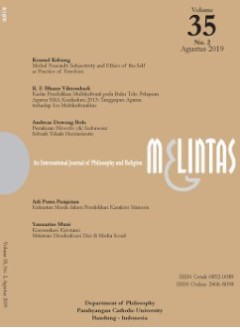
Melintas : An International Journal of Philosophy and Religion Volume 35 Nomo…
Our senses are amazing. Yet, there have been tendencies to underrate them. We know that it is from our senses that we build the concept of sensitivity. The latter, as a concept, however, has shifted from the realness of day-to-day experiences of the self to the domain of ideas. Can our ways of doing philosophy or doing theology be sensible – that these are real to our senses? A thorny questio…
- Edisi
- Cetakan ke-1
- ISBN/ISSN
- 0852-0089
- Deskripsi Fisik
- 123 hlm.; 29 cm.
- Judul Seri
- -
- No. Panggil
- Melintas Vol.35/No.2 2019
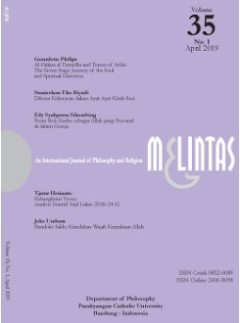
Melintas : An International Journal of Philosophy and Religion Volume 35 Nomo…
Why spirituality? Human beings as reflected in their knowledge are a multilayered reality. We cannot ignore some layers of our reality simply because we do not (want to) understand them. When reality is seen as a thing in itself, science as well as philosophy and theology might detach themselves and become ‘neutral’, which, in a sense, are not personal or related to human beings anymore. Sp…
- Edisi
- Cetakan ke-1
- ISBN/ISSN
- 0852-0089
- Deskripsi Fisik
- 107 hlm.; 29 cm.
- Judul Seri
- -
- No. Panggil
- Melintas Vol.35/No.1 2019
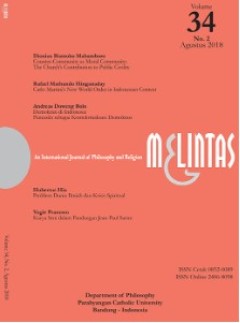
Melintas : An International Journal of Philosophy and Religion Volume 34 Nomo…
Jean-Paul Sartre offers a different way of looking at artworks. He offers psychological as well as phenomenological perspectives. The artworks referred to by Sartre include music, painting, literature, and theater. In his thoughts related to works of art, Sartre offers a notion of analogon, that has a key role to explain his concept of imagination. With this notion, he goes further to explain t…
- Edisi
- Cetakan ke-1
- ISBN/ISSN
- 0852-0089
- Deskripsi Fisik
- 100 hlm.; 29 cm.
- Judul Seri
- -
- No. Panggil
- Melintas Vol.34/No.2 2018
 Karya Umum
Karya Umum  Filsafat
Filsafat  Agama
Agama  Ilmu-ilmu Sosial
Ilmu-ilmu Sosial  Bahasa
Bahasa  Ilmu-ilmu Murni
Ilmu-ilmu Murni  Ilmu-ilmu Terapan
Ilmu-ilmu Terapan  Kesenian, Hiburan, dan Olahraga
Kesenian, Hiburan, dan Olahraga  Kesusastraan
Kesusastraan  Geografi dan Sejarah
Geografi dan Sejarah